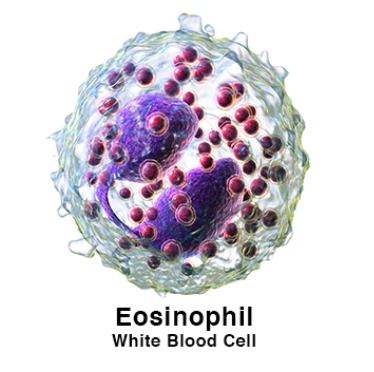09 Jun Does Your Child Have Allergies?
 If your child has asthma, eczema, or environmental allergies, then it is possible that your child may also have eosinophilic esophagitis (EoE). Children with EoE commonly have other allergic diseases. EoE is becoming an increasingly recognized cause of difficulty swallowing solid food as well as heartburn that is unresponsive to antireflux therapy.
If your child has asthma, eczema, or environmental allergies, then it is possible that your child may also have eosinophilic esophagitis (EoE). Children with EoE commonly have other allergic diseases. EoE is becoming an increasingly recognized cause of difficulty swallowing solid food as well as heartburn that is unresponsive to antireflux therapy.
EoE is a chronic immune system disease or inflammatory disorder. It is characterized by the building up of a particular white blood cell (called eosinophils) in the wall of the esophagus. The esophagus normally does not contain any eosinophils. Gastroesophageal reflux disease can induce a mild eosinophilia response, but severe eosinophilic infiltration of the esophagus is usually due to allergic causes.
EoE affects both children and adults. For unknown reasons, males are more commonly affected than females. As mentioned above, people with EoE commonly have other allergic diseases such as asthma or eczema, but a personal or family history of other allergic diseases may also be absent.
Symptoms of EoE
The exact pathogenesis of EoE is unknown, but here are some common symptoms in children:
- Picky eater
- Vomiting
- Abdominal pain
- Trouble swallowing (dysphagia)
- Food impaction
Adults may experience similar symptoms, but other major symptoms for adults include heartburn and chest pain.
Diagnosing EoE with Upper GI Endoscopy
An upper GI endoscopy (i.e., an esophagogastroduodenoscopy or EGD) with biopsies is required to make the diagnosis of EoE. Biopsies reveal an increased number of eosinophils in the esophagus. The importance of recognizing this condition lies in the fact that EoE requires therapeutic measures different than those used for gastroesophageal reflux.
Treatments for EoE
There are several treatment options available for EoE, but what is best for the child is in an individual decision based on a discussion with your doctor. The mainstay of treatment involves medications or dietary modifications. The natural history of EoE is unknown, but no cases of cancer have been reported to date.
Prognosis
Doctors are still learning about EoE and there is currently active research studies and medications trials underway.
The diagnosis of EoE is often delayed because of the lack of awareness of this disorder. Please consult with your physician if you are concerned that you or a family member may have symptoms consistent with EoE. To learn more about eosinophilic disorders, please watch the video below:
If you would like more information about gastrointestinal (GI) digestive disorders and nutrition in children, please contact Dr. Mona Dave’s Frisco Office or Request Appointment Here.